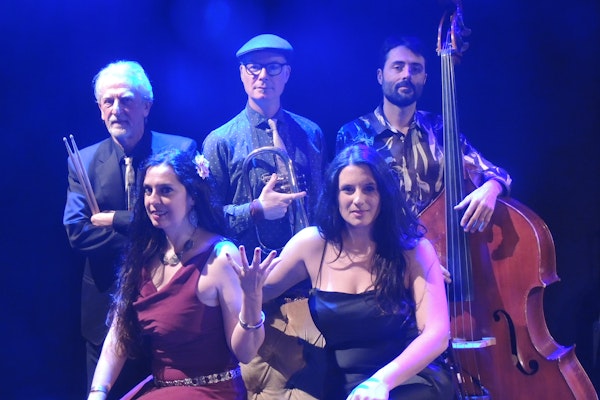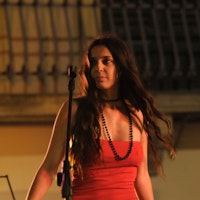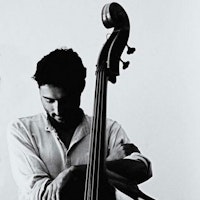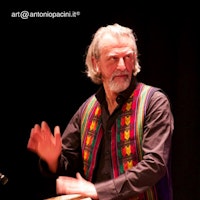
L' île Noire - feat. Javier Girotto & Badara Seck --- AlfaMusic 2024
music by Manuela Iori - lyrics by Maria Teresa Leonetti
"How to confine albums of similar openings towards the world within a few sentences of a review?" - Paolo Tocco - Raro più
"Two artists with the same poetic sensibility." - Salvatore Espostito - Blogfoolk
"They gave birth to this intense album." - Guido Festinese - Il Manifesto
"The wonder of voice and the richness of sounds [...] high-level author music" - Raffaello Carabini - Spettakolo.it
"an album with international appeal and vocation." - Lucrezia Monti - DaSapere
"Crossover music, Mediterranean, which can be light and poignant." - Beppe Ceccato - Musicabile TGCOM24
"Tradition and innovation come together and the final effect is surprising." - Sofia Maratheas - Cinecorriere news
"An album halfway between jazz and author’s song." - Giancarlo De Chirico - Extra Music Magazine
" It's really very rare to find a collection that can transmit such a variety of moods, and with such intensity... Listening to the album, track by track, you are literally dragged away in a mixture of introspection and innovation that goes far beyond what we’re used to." - Francesco Simone - I love Magazine
"The Island found and the people of the Waters ...our artists often succeed in expressing lyrical waves in melodies of both pentagram and poetic text, as in the case of the FIL ROUGE QUINTET in the beautiful and heartfelt performance L'ÎLE NOIRE... a jazz of spacious harmonies and fine arrangements in which to give voice to a universal lyric." - Fabrizio Ciccarelli - Rome InJazz
"... L'île noire, a musical album by the Fil Rouge Quintet, who don’t know what banality is. From song to song, you have the feeling of witnessing a stream of consciousness, a river of emotions that involves and overwhelms in a series of unique suggestions." - Francesco Ferri - Gingermag
" ...an ambitious musical and literary research project, which accompanies the listener through a multi-ethnic journey, where music and words merge in a magnificent melting pot of colors cleverly mixed, as the cultural influences that characterize the record." - Mauro Zappaterra - Jazz & Jazz Reloaded
L' île Noire, released in June 2024 for AlfaMusic, is an introspective and evocative album. Each person is an archipelago, composed and made of a thousand facets like life, as human experiences and "The black island" represents many parts. The album L' île Noire consists of seven tracks: six unpublished compositions composed and arranged by Manuela Iori with lyrics written by Maria Teresa Leonetti in Italian and French, and an important cover, Alexander Platz. Two special guests enrich the work. He is the master saxophonist Javier Girotto in the song Tango romanesco and the great Badara Seck, singer and expert in African music with great collaborations in music and film in Les villes cachées. The latter talks about the dramatic experience of migrants' sea travel.
Fil Rouge Quintet’s second work is characterized by an in-depth and sophisticated musical research that aims to never be taken for granted, even at a structural level. In fact, there are numerous written instrumental sections, as well as improvisation parts. There is a focus on rhythm: the love for odd tempo (where tablas are the masters), rhythmic detachments and sudden changes of tempo that create an always unexpected sound. The harmonic research has been inspired by the music from the world: from the Ethiopian jazz of Mulatu Astatke, from the dream trio of Avishai Cohen (not by chance the double bass is often the protagonist in the various songs), from African music but also from classical music greats like Mussorgsky.
Track by Track
In the first track L'île Noire, which gives the title to the album, it is about the personal experience of loneliness; Les villes cachées is about the journey out to sea and the loneliness of the migrant peoples who continue to live and struggle even after death in the hidden cities of a sea that has unjustly dragged them into its depths. It continues with a melancholy and disenchanted tango, Tango romanesco, which recalls the paternal love and the Sunday walks of a little girl together with her father in Rome forty years ago. We then move on to the freshness and lightness of a summer bonfire fueled by Le vent de la mer, the wind of the sea, which winks at Couleur Café by Serge Gainsbourg and follows an Alexander Platz in Fil Rouge style, clear tribute to the master Franco Battiato alluding to the elegance of Milva’s interpretation. In the last two tracks, united by the theme of no longer being, at least physically, we talk about a grasshopper La sauterelle as if it were a positive presence, perhaps inhabited by the soul of someone we had to greet "running, running": it is nestled in the window of a woman’s house who had to say goodbye to her mother, unexpectedly "soon" and in pandemic times, to remind her that she still lives around her and that maybe one day, as the text says: "I will look for you, I will find you, I will see you again". To conclude a beautiful suite, the Suite des promeneurs solitaires composed of four themes that revolve around four stories: that of a child turned angel, an elegant lady, alone and fragile in her illness, arrived in the sky on a carriage of orange clouds from the lights of the sunset, of a girl who wonders about the meaning of life, of a woman now aware of the transience of life and arrived at a consequent inner stillness.
LINE-UP:
Maria Teresa Leonetti - voice
Manuela Iori - piano, keyboard, choirs
Charles Ferris - trumpet, flugelhorn, effects
Ettore Bonafè - drums, percussion
Michele Staino - double bass
§§§§§§§§§§§§ §§§§§§§§§§§§ §§§§§§§§§§§§ §§§§§§§§§§§§
“We are borne with a red string tied to our left-hand pinkie that ties us to our destiny” — Chinese legend
The Fil Rouge Quintet project was born in 2015 and it rises from the intense understanding between two women, the singer and the pianist, who translate into words and music their melancholic mood, at the same time full of energy and dynamic. The incisiveness of the trumpet, the regular rhythms of the drums and the intensity of the double bass color and fill the sound. The first album "L'inconnue", the unknown in every one of us, published in spring 2016, received a good feedback in italian press (La Repubblica, La Nazione, corriere Fiorentino).
It is difficult to define our musical genre, however, if jazz comprises research and improvisation, with many contaminations, our project can be put into a jazz context.Our music touches the most diverse sounds, timbres and colors: Mediterranean melodies with Arabic and Maghreb echoes. Latin rhythms of bossanova and tango permeated with underground influences tied to funk and hip-hop not least blues and swing. Our music moves across different harmony. Alternating tonal and modal composition. Thus creating never taken for granted atmospheres.
The songs are predominately written in French, the language of the soul of the singer. They speak about the Alsatian Countryside, about people met during a one-year journey; they speak about complicated lives and friendships developed in a Winter-time Strasbourg, a city radiated by a light, white like snow. The songs speak about painful relationships, life beyond illness and oblivion. They speak about a father came to known in senile age with all his fragilities and regained wisdom. They speak about a mother, small and full of life that runs, runs every moment of the day, who finds peacefulness in long walks through the countryside, to look for herbs to cook with. Not least, foggy atmospheres along the Senna, evoked by Jean Gabin’s film o by Maupassant short stories.
Fil Rouge Quintet’s second work is characterized by an in-depth and sophisticated musical research that aims to never be taken for granted, even at a structural level. In fact, there are numerous written instrumental sections, as well as improvisation parts. There is a focus on rhythm: the love for odd tempo (where tablas are the masters), rhythmic detachments and sudden changes of tempo that create an always unexpected sound. The harmonic research has been inspired by the music from the world: from the Ethiopian jazz of Mulatu Astatke, from the dream trio of Avishai Cohen (not by chance the double bass is often the protagonist in the various songs), from African music but also from classical music greats like Mussorgsky.
“The album L’Inconnue is an elegant eulogy of musical and poetic life simplicity:
it draws pieces of life enlightened by memories, affections and love silences.”
Fulvio Paloscia, LA REPUBBLICA
"Amazing urban world music that gravitates toward soundtracks sophisticated film.
A tribute to French music, to chameleonic sensibility of Italian jazz, to music experiments of groups like Les Negresses Vertes and singers like Zaz.”
Giovanni Ballerini, LA NAZIONE
The main live concerts: Cantina Bentivoglio (Bo) - Padova jazz club - U-Percut jazz club (Marseille - FR) - La Sala del Rosso (FI) - Ricomincio da tre (PG) - Marche jazz network (Camerino, MC) - Teatro Miela (Trieste) - Bari in jazz festival - Café Le Bovary (Luxembourg) - Società Dante Alighieri (Luxembourg) - Le Murate Caffè Letterario (Firenze) - Tradizioni Popolari festival (Firenze) - L'Aérogare (Metz, FR) - TUFA cultural centre (Trier, DE) - L'Archiduc (Bruxelles, BE) - De Floeren AAp, (Mechelen, BE) - New Rocky Pompadour, (Bruxelles, BE).









